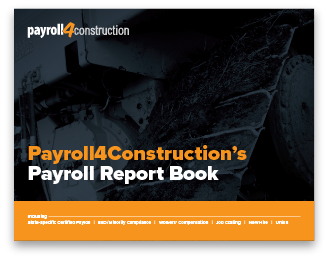Prevailing Wage in Wisconsin A Complete Guide for Contractors
Overview of the Wisconsin Prevailing Wage Act
Wisconsin repealed its state prevailing wage laws in the 2017-2019 state budget, giving contractors more flexibility on state and local public works projects. However, federal Davis-Bacon Act requirements still apply to federally funded construction projects in Wisconsin, ensuring contractors and subcontractors pay standardized wages that reflect local labor agreements for similar work.
For any construction company working on federally funded projects in Wisconsin, Payroll4Construction is here. As a complete payroll service, Payroll4Construction is built to keep contractors compliant with certified payroll reporting and federal prevailing wage rate determinations using the WH-347 Form.
Keep reading to learn more about Wisconsin's prevailing wage requirements and how we can help you.
What is Prevailing Wage in Wisconsin?
Wisconsin repealed its state-specific prevailing wage law in 2017. As a result, state projects bid on after September 23, 2017, and local projects bid on after January 1, 2018, are no longer subject to state prevailing wage requirements.
Public works projects funded solely by state or local governments are not required to comply with prevailing wage regulations. However, for state-funded construction projects, the prevailing wage rates now follow those set by the U.S. Department of Labor under the Davis-Bacon Act.
This means Wisconsin contractors face a two-tier system:
- State and Local Projects: No prevailing wage requirements (projects funded solely by Wisconsin state or local governments)
- Federal Projects: Must comply with Davis-Bacon Act prevailing wage requirements
The Davis-Bacon Act applies to contractors and subcontractors performing work on federal or District of Columbia contracts. In Wisconsin, this includes:
- Highway and infrastructure projects receiving federal transportation funding
- Federal building construction projects
- Projects funded through federal grants or assistance programs
- Any construction contract where the federal government contributes funding
Under the Davis-Bacon Act, construction workers on covered projects must receive minimum hourly wages and fringe benefits based on local standards for similar work within Wisconsin as determined by the U.S. Department of Labor.
Don’t Let Prevailing Wage Compliance
Slow Down Your BusinessPrevailing Wage Rate Determination
Setting Initial Rates
The Davis-Bacon Act directs the Department of Labor to determine such locally prevailing wage rates. The U.S. Department of Labor's Wage and Hour Division has several crucial responsibilities related to establishing and maintaining prevailing wage rates for Wisconsin projects.
The federal agency must:
- Determine appropriate prevailing wages, including hourly rates and benefit rates for Wisconsin localities
- Publish these rates for use in federally funded projects
- Include these rates in all project specifications and contracts
- Update rates periodically to reflect current local conditions in Wisconsin
Rate Calculation Method
The U.S. Department of Labor follows a structured approach to determine fair and accurate compensation rates for Wisconsin. They establish rates by analyzing:
- Collective bargaining agreements in Wisconsin localities
- Actual wages paid on similar construction projects in the area
- Various sources of wage information for the geographic region
- Input from public hearings when necessary
Prevailing Wage Requirements
Federal prevailing wage laws establish minimum compensation standards for workers on federally funded projects in Wisconsin. These requirements ensure fair labor practices and create a level playing field for all contractors bidding on federal work.
- Contractor

Contractors working on federally funded projects in Wisconsin bear significant responsibility for ensuring project compliance with Davis-Bacon Act regulations. These requirements apply throughout the entire project lifecycle:
- Understanding which projects require Davis-Bacon compliance
- Obtaining and reviewing applicable federal wage determinations for Wisconsin
- Including proper wage determinations in all bids and subcontracts
- Ensuring all subcontractors understand federal wage requirements
- Paying Davis-Bacon prevailing wages to all covered workers
How to Submit Prevailing Wage Proof in Wisconsin
Since Wisconsin does not have its own prevailing wage registration system, contractors must focus on federal Davis-Bacon compliance for applicable projects.
Key compliance steps include:

- Project Identification: Determine if your Wisconsin project receives any federal funding that triggers Davis-Bacon requirements
- Wage Determination Review: Obtain the correct federal wage determination for your project location and type
- Worker Classification: Properly classify workers according to federal job categories
- Payroll Documentation: Maintain weekly certified payroll records that meet federal standards
- Record Keeping: Store all required documentation for federal inspection periods
In essence, contractors need certified payroll records and evidence of proper wage payments from federally funded projects. The Davis-Bacon Act requires contractors to certify that they:
- Will pay federal prevailing wages to workers on covered projects
- Maintain accurate records of wages and hours worked
- Submit weekly certified payroll reports to contracting agencies
- Comply with federal record-keeping requirements
This compliance must be maintained throughout the duration of any federally funded project in Wisconsin.
Compliance, Enforcement and Consequences
The federal Davis-Bacon system relies on robust compliance mechanisms and meaningful penalties to ensure all parties adhere to established standards on federally funded projects in Wisconsin. These measures protect workers' rights, ensuring compliance with wage standards while maintaining the integrity of federal projects.
Wage Payment Rules
Davis-Bacon requirements establish minimum compensation requirements that cannot be circumvented on federally funded projects in Wisconsin.
The rules surrounding wage payment include:
- Workers must receive federal prevailing rates for their job classification
- Rates include both actual wages and fringe benefits
- Rates are based on local wage surveys and collective bargaining agreements
- Employers cannot pay below these rates, even with worker consent
- Certified payroll records must be submitted weekly
Violation Consequences
Significant operational and financial repercussions await contractors who fail to comply with federal prevailing wage requirements on Wisconsin projects, potentially jeopardizing their entire business.
Construction businesses are at risk of federal penalties, including:
- Withholding of contract payments
- Debarment from federal contracts
- Assessment of unpaid wages plus interest
- Civil penalties and liquidated damages
- Potential termination of federal contracts
- Exclusion from future federal projects
Prevailing Wage Whistleblower Protections
Federal law includes anti-retaliation provisions specifically designed to protect workers who report violations of Davis-Bacon requirements on Wisconsin projects.
Employees are protected from retaliation when reporting federal prevailing wage violations:
- Protection from termination
- Protection from disciplinary action
- Protection from discrimination
- Protection from threats
These protections apply to workers reporting underpayment, misclassification or certified payroll record falsification on federally funded projects in Wisconsin.
Penalties
The legal framework includes substantial financial penalties and establishes clear liability structures to encourage compliance with federal requirements.
Financial consequences include:
- Withholding of federal contract payments until violations are corrected
- Payment of back wages to affected workers
- Administrative penalties and liquidated damages
- Joint liability between contractors and subcontractors
- Potential criminal charges for willful violations
How Payroll4Construction Helps You Stay Compliant
Payroll4Construction is a construction payroll service that specializes in helping contractors and construction companies navigate the complex federal wage regulations of the Davis-Bacon Act on Wisconsin projects.
These time-saving services reduce administrative hours spent on complex federal wage calculations and paperwork. In turn, this gives the team peace of mind knowing that Davis-Bacon obligations are being handled correctly on Wisconsin projects.
Payroll4Construction helps Wisconsin contractors stay compliant, streamline WH-347 certified payroll reporting and avoid costly Davis-Bacon violations.
Prevailing Wage Exceptions
Most federally funded projects in Wisconsin must adhere to Davis-Bacon prevailing wage laws. However, certain exemptions exist under specific circumstances.
These exemptions don't release contractors from fair wage obligations. Instead, the exemptions allow them to follow alternative regulatory frameworks or indicate projects where federal prevailing wage requirements don't apply.
Projects may be exempt from federal prevailing wage requirements if they:
Fall below the federal monetary thresholds:
- Under $2,000 for federal construction contracts
- Maintenance work below Davis-Bacon coverage thresholds
Are funded solely by state or local government sources:
- Wisconsin state-funded highway projects
- Local government construction projects without federal assistance
- School district projects using only state or local funding
-
Qualify for specific federal statutory exemptions such as:
- Certain volunteer work
- Emergency repair work below federal thresholds
- Private construction projects
- Specific projects explicitly exempted by federal law
In all cases, contractors remain responsible for understanding which wage standards apply to their Wisconsin projects. When in doubt, following the higher wage standard ensures compliance with all applicable regulations.



